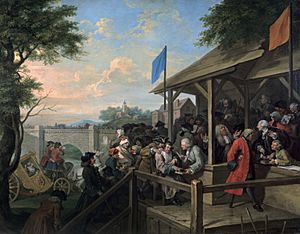List of MPs elected in the 1754 British general election facts for kids
The 11th Parliament of Great Britain was a group of 558 people, called Members of Parliament (MPs). They were chosen in 1754 to represent 314 different areas, known as constituencies, across Great Britain. These MPs worked together in the Parliament to make laws and decisions for the country.

Contents
What Was Parliament Like in 1754?
Back in 1754, the way people voted and how political parties worked was quite different from today. The two main political groups were the Tories and the Whigs. For a long time, these two groups had very strong disagreements. However, by 1754, their differences weren't as big as they used to be.
The Main Political Groups
- Whigs: Generally supported the power of Parliament and a more modern approach to government. Many Whigs were part of the "Administration," meaning they supported the current government leaders.
- Tories: Often favored the power of the King and traditional ways.
In the 1754 election, most contests weren't really about which party was better. Instead, they were often about local issues or the popularity of individual candidates. Only a few places, like Oxfordshire and Reading, still had strong party rivalries. This election was one of the last times that old-style party battles were so important in those areas.
Who Won the Election?
The person in charge of managing the government's election efforts was a man named Viscount Dupplin. He reported the results to the Prime Minister, Thomas Pelham-Holles, who was a Whig.
Here's how the seats in Parliament were divided after the 1754 election:
- Administration (Whigs): 368 MPs. These were the MPs who supported the government.
- Tories: 106 MPs.
- Opposition Whigs: 42 MPs. These were Whigs who did not support the current government.
- Doubtful: 26 MPs. These MPs' loyalties were not clear.
This shows that the government, led by the Whigs, had a very strong majority in Parliament after this election.
By-elections
Sometimes, an MP might leave Parliament before the next general election. This could happen if they resigned, passed away, or for other reasons. When this happened, a special election, called a by-election, would be held to choose a new MP for that area.
- List of Great Britain by-elections (1754–74)
See also
- 1754 British general election
- List of parliaments of Great Britain
- Unreformed House of Commons
 | Selma Burke |
 | Pauline Powell Burns |
 | Frederick J. Brown |
 | Robert Blackburn |

